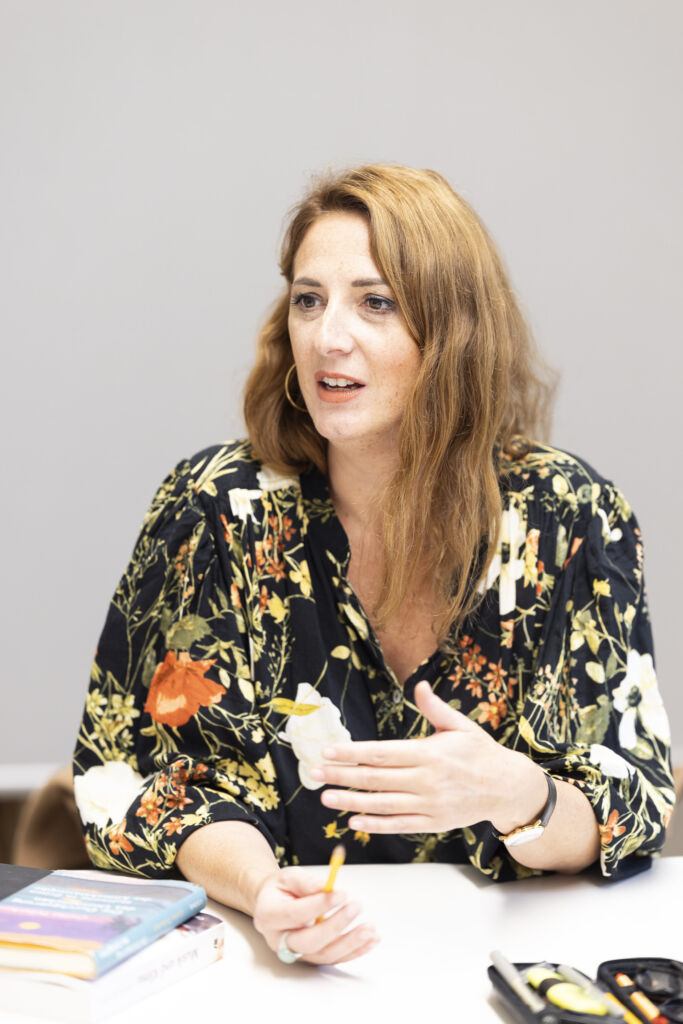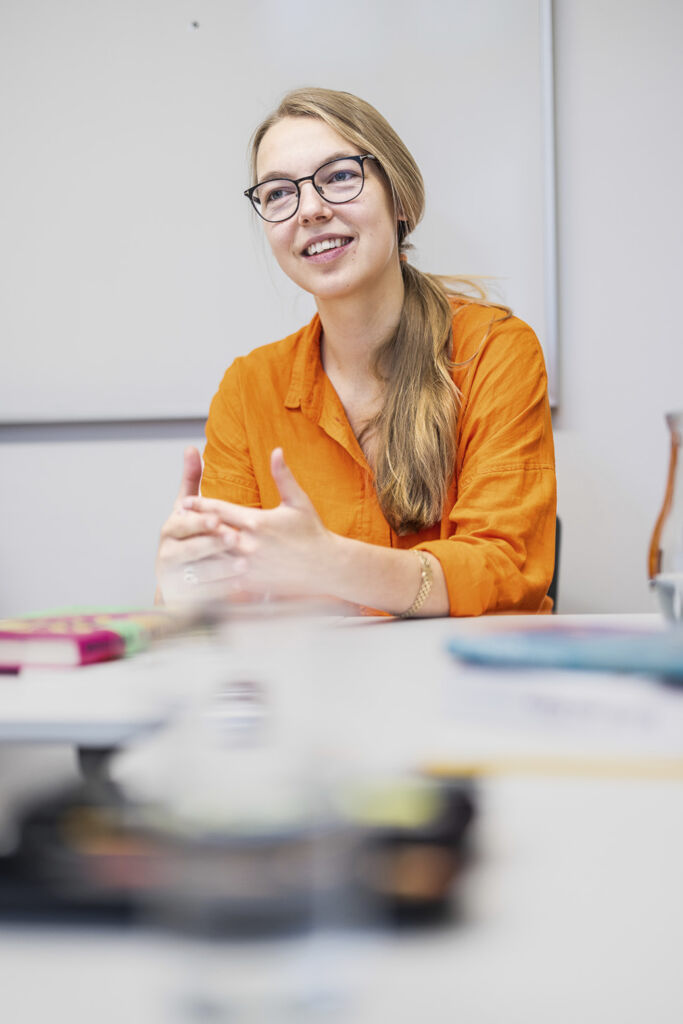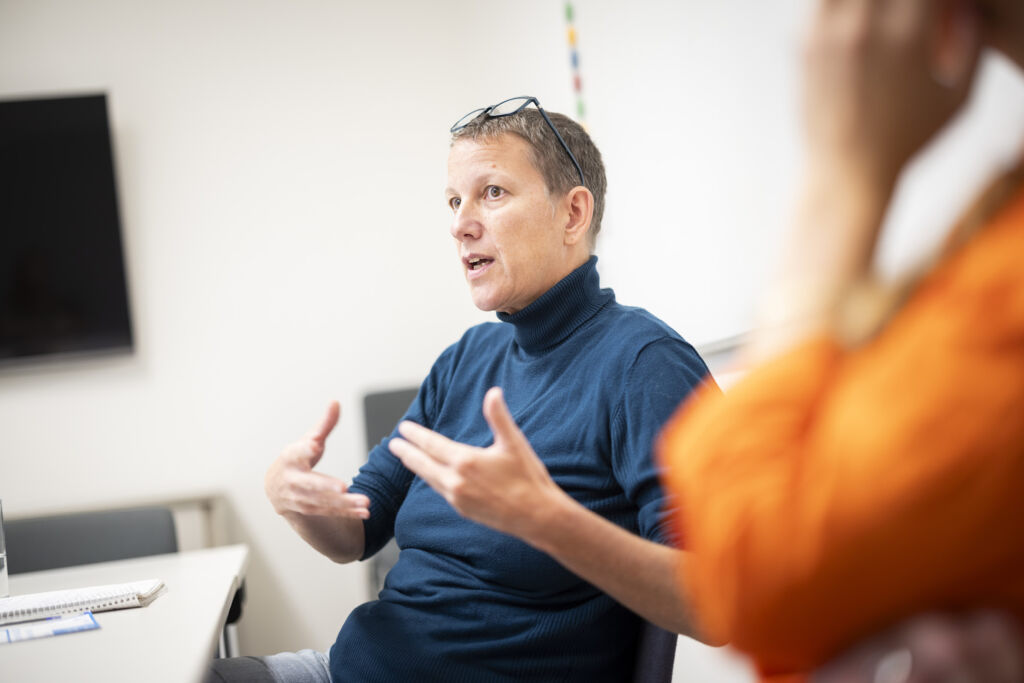What role can the arts and culture play in shaping a sustainable future? This question was discussed by Birgit Huebener (Sustainability Coordination Office and green mdw), Tanja Obex (faculty member, Department of Music Education Research and Practice), and Annie Ternström (voice student).
Do you think it’s possible to sensitise people to the topics of climate change and sustainability via the “medium” of the arts and culture?
Tanja Obex (TO): It absolutely is. Art and above all music are capable of telling stories, stories that make it possible to see the world, things in general, and how they all relate to each other in a certain—perhaps different—way.

Annie Ternström (AT): Especially when a theme is difficult and complex, many people shy away from any sort of engagement. But if one presents such themes in connection with music or other art forms, people can end up daring to contemplate and engage with them after all.
Birgit Huebener (BH): I’d take a broader view of the arts as a concept. To me, it’s above all about creativity, about this feeling that I can have an effect—not just as an artist onstage but also as part of the audience. And in academia, it’s become more and more apparent just how much creative, arts-derived approaches are needed in order to succeed in conveying difficult content. At the same time, though, I believe that artistic approaches themselves have an inherent transformative power.
How do you think that your present doings as musicians or as teachers in the artistic and cultural realm relate to the future state of the world? Is cultural work of global relevance?
TO: In my view, the arts—and thus music—have always possessed a political component. So where our current situation and planet-wide catastrophe are concerned, it’s indeed the case that the arts and music can assume their political responsibility and react.
BH: While I won’t say here that music is the universal language, I do think that artistic formats and approaches can make a connection, can translate and hence transform. Which, to my mind, begs the question: Need language necessarily be the starting point of all contemplation? Or might artistic statements and expressive forms also serve as starting points where important questions are concerned?
AT: I think there are lots of overlaps and synergistic effects here that can help make themes more accessible.

TO: That also goes a certain way toward reducing the stress that results from how, in our overall society’s production of knowledge, all of the pressure is on individual protagonists.
BH: I’m becoming more and more aware of how the starting point for numerous instances of artistic expression is the natural environment or nature. Works like Haydn’s Creation and Beethoven’s Pastorale are, after all, based on various concepts and notions of nature from that period along with how the composers themselves related to them.
TO: When we speak of nature, we’re speaking from the perspective of our Western thinking. But when we contemplate the climate crisis or socioecological crises, I’d say that our Western thinking is in fact responsible for these to a certain extent…
BH: …not just to a certain extent…
TO: …because our behaviour towards nature, toward other human beings, is entirely exploitative. So if we then go and develop sustainability initiatives on the basis of our Western thinking, we’re doing it with the very sort of thinking that caused these problems in the first place. Which can’t work, since it entails our perpetuation of these colonial and imperial practices.
What should be the first step instead?
TO: If we actually want to talk about sustainability, about a different way of thinking, then we need to break with conventional dualities like humanity and nature or nature and culture. Human beings need to conceive of themselves as being part of nature rather than separate from it. It’s something we have to understand, because it’s only by doing so that we’d actually be in a position to stop constantly harming “nature”.
BH: That leads right to the question of how we conceive of art. Do we think of it as something elitist or as a collective activity? Mozart and Beethoven didn’t fall from heaven as geniuses; there’s always also a social structure in which such people are anchored. To me, understanding these relationships seems pretty basic. And this collaborative doing is important and necessary if art is to continue existing in a way that makes any sense.

Assuming one takes the changes associated with the climate crisis as a creative challenge: What role can institutions like the mdw and/or people who work in music play in this overall societal transformation?
TO: Thinking of the green mdw initiative, I actually see a number of efforts that could be considered sustainable. They have as much to do with events as they do with our everyday work at the University and with relevant educational efforts like the Lectures for Future or Peter Röbke, Hans-Peter Manser, and Dietmar Flosdorf’s project at the music school in Wolkersdorf. I think that institutions as well as musicians function as role models, here—and that many of them have indeed been assuming this societal responsibility. The act of “shaping things”, however, needs to be understood not as “offering simple solutions” but rather as an effort to catalyse processes of thought and action in view of the ongoing polycrises and/or polycatastrophes.
AT: I think it’s very important for themes relating to sustainability and the environment to be part of the conversation. The mdw is a very multicultural institution. That’s great—and even just for this reason alone, we see various approaches that represent a great enrichment when it comes to themes like this one. It also offers us an opportunity to understand differing standpoints. I think it would be important to motivate faculty members even more to build these themes into the subjects they teach—above all into subjects that would seem to have nothing to do with the climate crisis at first glance, subjects where not a word is being spoken about it at the moment.
BH: What we need, I think, are deep-reaching structural changes, and such changes need space and time. My motto is: less is more. I think sustainability can succeed only in an atmosphere of sufficiency and based upon the conviction that it will be a net win for us rather than a loss.
On the other hand, success—particularly in the music business—is often measured by the number of tours and how far one travels. How might attitudes change in this respect?
AT: That’s a very difficult challenge. If, say, we have a system where getting somewhere by train is more expensive than flying, then saying “I’ll never choose to fly” is a tall order particularly for students just beginning their careers. Even if I make an effort to travel by train as often as possible, it’s sometimes just not feasible in a financial sense—even if I would’ve been able to plan in the extra time it would take. I do end up ruminating about that, and it sometimes leads to a feeling of powerlessness, of being doomed to stay stuck in this system as long as we have these economic limitations.
TO: That’s an important point: alongside the ecological and social dimensions of sustainability, there’s also an economic one. A basic demand with respect to sustainability is for the creation of a balance between these three dimensions. When I look at various different initiatives, however, I get the impression that the economic aspect is always the determinative one. In that perspective, the potential for ecological and social transformation is measured in terms of economic growth—which I view as one of the main problems where sustainability and transformation are concerned.
BH: Transformation has to begin in the mind. There needs to be a rethinking of the big issues—of the imperial lifestyle, of the notion that there can be no economic viability without growth, etc.
Ms. Ternström, you’re a student representative for the Voice and Music Theatre Direction programmes. What’s your impression? Is sustainability a topic among your colleagues?
AT: That varies greatly. Many take the attitude of “I have to finish my studies as soon as possible, start working, and build a career”, because they’re very strongly anchored in this performance- and achievement-oriented system. But there are also lots of people who refrain from eating meat, for example, and socioecological themes do indeed get discussed. In my generation, there’s also more awareness of just how important mental health is. It’s a topic that’s not as taboo as it used to be; after all, we also need to be able to deal sustainably with our own selves.
TO: I notice how young people approach sustainability very differently than we did—like when I think of their activism with Fridays for Future, the arguments they employ, and also how they reference the idea of intersectionality.
In closing, a look towards the future: How might a positive vision for the future of your respective areas of work look? What goals could or should be met in the coming years?
AT: It would be nice to create spaces where people could come together and engage in calm discussion of things; I’d like to push for that.What’s more, I hope the music-making industry will change such that we’ll have more time to get to places—so you we do without flying, at least within Europe. And there are also questions like: Do I have to wear a different or new dress for every concert? No, we’re perfectly capable of buying vintage or second-hand clothes—which I, personally, find original—as well as wearing the same outfits multiple times.
BH: I likewise dream of a space where dialogue and exchange take place, regardless of whether it’s real or digital. And what’s extremely important to me is networking, searching for and finding synergies, and finding things I can support that already exist without having to go and invent something new. A positive version of the future, to my mind, would eliminate the hecticness and high-speed nature of our everyday working lives. I’ve quite deliberately reduced my work commitment to 25 hours, and I’m attempting to put a bit of this “less is more” idea into practice out of a conviction that doing so contributes to sustainability. I’d also find it important to do a complete rethink of how we relate to work.
TO: I think I can very happily second this idea of deliberate deceleration and reduction, which is a feature of how I work, too. And here’s another aspect that seems important to me: I view it as my mission, both as a researcher and as a teacher, to thematise aspects like hope in place of this impotent feeling of “it’s all too late, anyway”. Hope in the sense of keeping present dangers in mind while simultaneously developing an ability to imagine a good life. Which brings us back to where this conversation started: to me, it would be important to educate students terrestrially—by which I mean a type of education that enables individuals to experience themselves as connected with the world, as inseparable parts of nature. Only when that idea is firmly nested within us can we begin to view putting an end to the exploitation of nature and other existences as a matter of course—at which point we truly will be able to speak of a social and ecological transformation.

